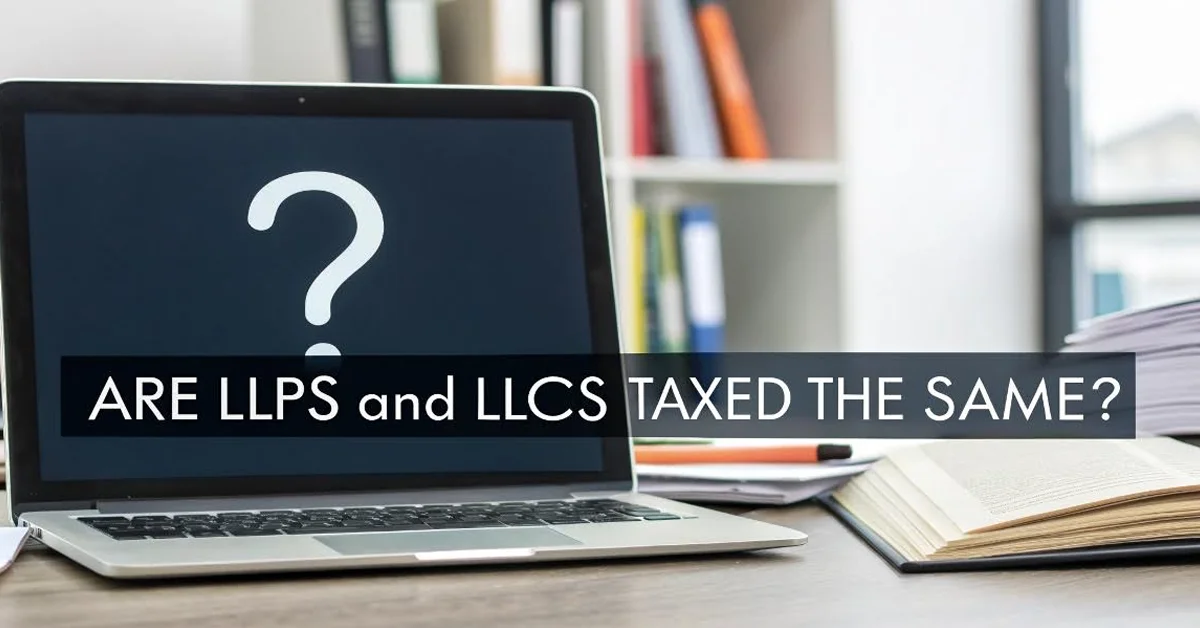Are LLPs and LLCs Taxed the Same?

If you’re deciding between an LLPs and LLCs, understanding their tax differences is not optional, it’s essential. While both offer limited liability protection and pass-through taxation, the real distinctions start when you look at IRS classification, tax flexibility, and how much you’ll owe in self-employment taxes.
In this guide, you’ll learn the key differences between LLP and LLC taxation, how each is treated under federal tax law, and which option may save you more money.
What Is an LLP?
A Limited Liability Partnership (LLP) is a legal business structure that combines elements of a general partnership with liability protection.
LLPs are most common among professional services think law firms, accounting practices, and architecture offices.
In many states, only licensed professionals can form LLPs.
Tax Treatment of LLPs
From a tax perspective, an LLP is treated as a pass-through entity. That means the partnership does not pay income tax at the business level. Instead, income “passes through” to the partners, who report their share on personal tax returns.
- The LLP files IRS Form 1065 (U.S. Return of Partnership Income).
- Each partner receives a Schedule K-1, which outlines their share of profits and losses.
- Partners are typically responsible for self-employment tax on their share of business income.
What Is an LLC?
A Limited Liability Company (LLC) is a flexible and widely used legal structure that offers liability protection, pass-through taxation, and optional tax classification.
LLCs are available to most types of businesses, including retail, online stores, consulting firms, and freelancers.
Tax Treatment of LLCs
By default:
- A single-member LLC is taxed as a sole proprietorship.
- A multi-member LLC is taxed as a partnership.
However, LLCs can also elect to be taxed as:
- An S Corporation by filing IRS Form 2553.
- A C Corporation by filing IRS Form 8832.
This flexibility is a key advantage over LLPs.
Major Tax Differences Between LLPs and LLCs
Let’s break down the key tax-related differences:
1. Self-Employment Tax
In an LLP, partners are considered self-employed. They must pay self-employment tax on their entire share of the income.
In an LLC, members also pay self-employment tax by default. However, if the LLC elects S Corporation status, the owner can pay themselves a reasonable salary and take the remaining income as a distribution, which is not subject to self-employment tax.
This can save thousands in taxes each year.
2. Tax Filing Forms
- LLPs file Form 1065, and partners receive a Schedule K-1.
- LLCs may file:
- Schedule C (if single-member)
- Form 1065 (if multi-member)
- Form 1120S (if taxed as S Corp)
- Form 1120 (if taxed as C Corp)
3. IRS Classification Flexibility
LLPs do not have the option to elect S Corporation or C Corporation tax status. They are taxed as partnerships by default.
LLCs, on the other hand, offer more flexibility in choosing how the entity is taxed, which can lead to tax advantages.
4. State-Level Taxes and Fees
Some states impose additional franchise taxes or fees on LLCs or LLPs. It’s important to check with your state’s Secretary of State or tax board.
For example:
- California imposes an $800 minimum franchise tax on both LLCs and LLPs.
- Texas charges a franchise tax based on revenue.
Which Is Better for Taxes: LLP or LLC?
The answer depends on your profession, income level, and business goals.
LLPs May Be Better If:
- You are part of a professional service firm.
- Your state requires professionals to operate as LLPs.
- You don’t mind paying self-employment tax on all income.
LLCs May Be Better If:
- You want flexibility in tax classification.
- You plan to reinvest profits and save on taxes.
- You want the option to elect S Corp status and lower your self-employment tax burden.
Real-World Example
Let’s say two business owners each earn $150,000 annually.
- An LLP partner will owe self-employment tax on the full $150,000.
- An LLC owner taxed as an S Corporation may take $80,000 as salary and $70,000 as distribution, only paying self-employment tax on the salary.
The LLC owner could save thousands annually in taxes.
Compliance and Administrative Differences
While taxation is important, don’t overlook compliance differences:
- LLPs usually require a written partnership agreement.
- LLCs must create an operating agreement (though some states don’t mandate it).
- Annual reporting, state filings, and franchise taxes may differ.
LLCs are often favored for their simplicity and flexibility.
Common Misconceptions
“LLPs and LLCs Are the Same Thing”
Wrong. While both offer limited liability and pass-through taxation, their structure and tax options are different.
“You Don’t Have to File Taxes if You Made No Income”
Even if the LLP or LLC made no money, you still have to file your federal return (Form 1065, 1120, or 1120S) to stay compliant.
“You Can Avoid Self-Employment Tax Easily”
Only LLCs with S Corporation election can reduce self-employment taxes—and only if done correctly with IRS approval.
Summary Table: LLP vs. LLC Tax Comparison
| Feature | LLP | LLC |
| Default Tax Status | Partnership | Sole Proprietor / Partnership |
| Option to Elect S Corp Taxation | No | Yes |
| Self-Employment Tax on All Income | Yes | Only by default |
| IRS Filing Form | 1065 + K-1 | 1065, 1120, 1120S, or Schedule C |
| Flexibility | Low | High |
Final Thoughts
LLPs and LLCs may look similar on the surface, but their tax implications can lead to very different outcomes for your wallet.
If you are a licensed professional required to use an LLP, understand that you may pay more in self-employment taxes.
If you have the freedom to choose an LLC and want the option to reduce your tax burden, electing S Corporation status could be a smart move.
Always consult a CPA or tax advisor before choosing your business structure. Tax laws change often, and professional guidance ensures you make the most financially sound decision for your business.
FAQS
Do LLPs and LLCs both have pass-through taxation?
Yes, by default both LLPs and LLCs are pass-through entities. This means the business itself doesn’t pay income tax profits or losses pass through to owners’ personal tax returns. However, LLCs have more flexibility in changing their tax status.
Can an LLC avoid self-employment taxes?
LLCs can reduce self-employment taxes if they elect to be taxed as an S Corporation. In that case, the owner can take a reasonable salary (subject to payroll tax) and take the rest as a distribution (not subject to self-employment tax). LLPs don’t have this option.
Is a Schedule K-1 used for both LLPs and LLCs?
Yes, if the LLP or LLC has multiple owners and is taxed as a partnership, each partner or member receives a Schedule K-1. It outlines their share of the profits, losses, and deductions, which they report on their personal tax return.
Do LLP partners get taxed on all their income?
Yes. LLP partners are considered self-employed, so they pay self-employment tax on their entire share of the business income. There is no way to split income between salary and distributions as with an LLC taxed as an S Corp.
Can LLCs be taxed as corporations?
Yes. LLCs can choose to be taxed as either an S Corporation or C Corporation by filing the proper forms with the IRS (Form 2553 or 8832). This flexibility allows LLCs to plan more strategically for taxes compared to LLPs.
Are state taxes different for LLPs and LLCs?
State taxes vary. Some states charge different franchise or annual fees for LLCs and LLPs. For example, in California, both pay $800 minimum franchise tax, but LLCs may also owe a gross receipts fee based on income.
Do single-member LLCs pay self-employment tax?
Yes. A single-member LLC is taxed like a sole proprietorship by default, so the owner pays self-employment tax on all net earnings. To change this, the LLC must elect S Corp taxation and follow IRS rules carefully.
Which is better for tax savings LLP or LLC?
An LLC may offer more opportunities for tax savings, especially if it’s taxed as an S Corporation. LLPs have fewer tax options and generally face higher self-employment taxes, making LLCs a more tax-efficient choice for many businesses.
What IRS forms are used by LLPs and LLCs?
LLPs file IRS Form 1065 for the business and issue Schedule K-1s to each partner. LLCs use Schedule C (sole proprietorship), Form 1065 (partnership), Form 1120 (C Corp), or Form 1120S (S Corp), depending on their tax classification.
Should I consult a tax advisor before choosing?
Absolutely. Choosing between an LLP and LLC can have lasting tax consequences. A CPA or tax attorney can help you decide based on your income, business type, and long-term goals. DIY decisions can cost more in the long run.






